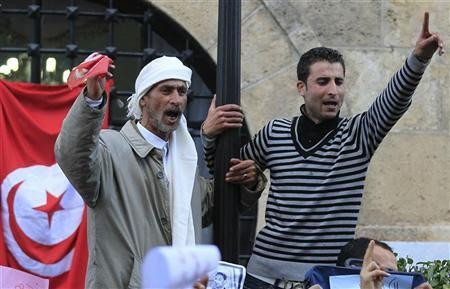Tunisia: Secular-Religious Tensions Signs of a Struggle for Identity?

Tunisian police on Sunday broke up a mob of angry Salafists who tried to attack a TV network that aired a film on the Iranian revolution, raising fears the growing movement could provoke more unrest just two weeks away from elections where Tunisians will choose members of a constituent assembly tasked with crafting a new constitution.
The group of Islamic militants reportedly targeted Nessma TV for airing "Persepolis", an award-winning French-Iranian animation film based on Marjane Satrapi's autobiographical and eponymous graphic novel, which they say is offensive to Islam.
The feature portrays the last days of the US-backed shah regime and the subsequent 1979 revolution led by Ayatollah Khomeini through the eyes of a young girl.
"There was a first attempt to attack our headquarters by a group of around 200 Salafists, who were dispersed by police before reaching our offices," said Nebil Karoui, the head of the private channel told the AFP.
The incident was later confirmed by the country's interior ministry's spokesman, Hichem Meddeb, who said that up to around 100 people had been rounded up.
"Some 200 Salafists who were later joined by another hundred people headed towards Nessma to attack the station. Security forces stepped in and broke up the posse," he told AFP.
Karoui also suggested that messages calling for Nesma to be torched and for the channel's journalists to be killed emerged on the social network Facebook soon after the animation film was aired.
"Nessma is the progressist channel in the Maghreb and we will not be deterred. We will continue to programme whatever we choose. We did not kick one dictatorship out to bring in another," he added.
The incident took place just a day after a reported two hundred protestors stormed a university campus in the city of Sousse, south of Tunis, Sunday October 9, after a female student was refused a place because she was wearing a full face veil, which is banned in Tunisian universities.
The latest incidents prove that Tunisia is struggling to come to terms with its new political landscape, and identity as secularists compete with religious movements that want to be represented in the domestic political sphere.
Many observers have voiced fears that Islamic movements in Tunisia and the rest of the countries affected by the Arab Spring could try to gain advantage from the wave of change, but in the case of Tunisia, its Islamic political wing is still divided.
The Tunisian Salafist movement, whose Tahrir party has not been legalised, is known to be an ultra-conservative conservative and radical branch in political Islam.
The movement is however competing with the Ennahda, Tunisia's leading Islamist party, which has condemned the attack on Nesma.
However, Ennahda's leader Samir Dilou described the move as an "isolated incident" that should not provoke concern about growing radical influence, according to the AFP.
Other religious political party condemning the Nesma incident included the Demcratic Progressive party and the left-wing Ettakatol, whose leader, Nadia El Fani, voiced "solidarity" with the station.
The latest attack came after six Salafists were arrested in Tunis in June after they stormed a cinema and broke its glass doors in a bid to stop the screening of the film neither "Neither Allah nor Master" on secularism in Tunisia.
Tunisia's struggle appears to be a consequence of the Ben Ali regime, which ruled the country with an iron fist for twenty-three years, and actively suppressed religious claims and religious political movements.
Ben Ali's ousting thus represents for many the opportunity to organise new Islamic-based political movements.
Among those, the Salafist group known as Ansar al-Shari'a in Tunisia (AST), and its media outlet al-Qayrawan Media Foundation (QMF) have gained in popularity and staged a string of high profile actions aimed at highlighting their organisation.
Since April, the group has been holding rallies, created Facebook pages and garnered the attention of online jihadists at Ansar al-Mujahidin and al-Jahad al-'Alami, two of the most popular Arabic-language jihadist forums.
The ASDT has also been heading a campaign calling on the liberation of Tunisian prisoners in Iraq who they believe have been unfairly arrested.
The Salafist movement in Tunisia seems however more concerned with what they see as an attempt by secularists encouraged by the western countries to drive religion out of the state than calls on Jihad.
The fear that western countries such as France or the U.S. could try to use secular politicians to interfere with the internal affairs of the country seems to have contributed in the rise of the Salafist movement in the region.
The recent incidents in Tunisia thus highlight the secular-religious tensions that have gripped the country for so long. However without direct oppression from the state, new religious movement will try to make their mark, not necessarily with the hope of acquiring power, but rather to be part of the new political landscape and give their aspirations a voice.
The struggle between secularist and religious parties, also illustrate the struggle between two visions of Tunisia, which prove the country still have to come to terms with its Ben Ali-free identity.
© Copyright IBTimes 2025. All rights reserved.





















